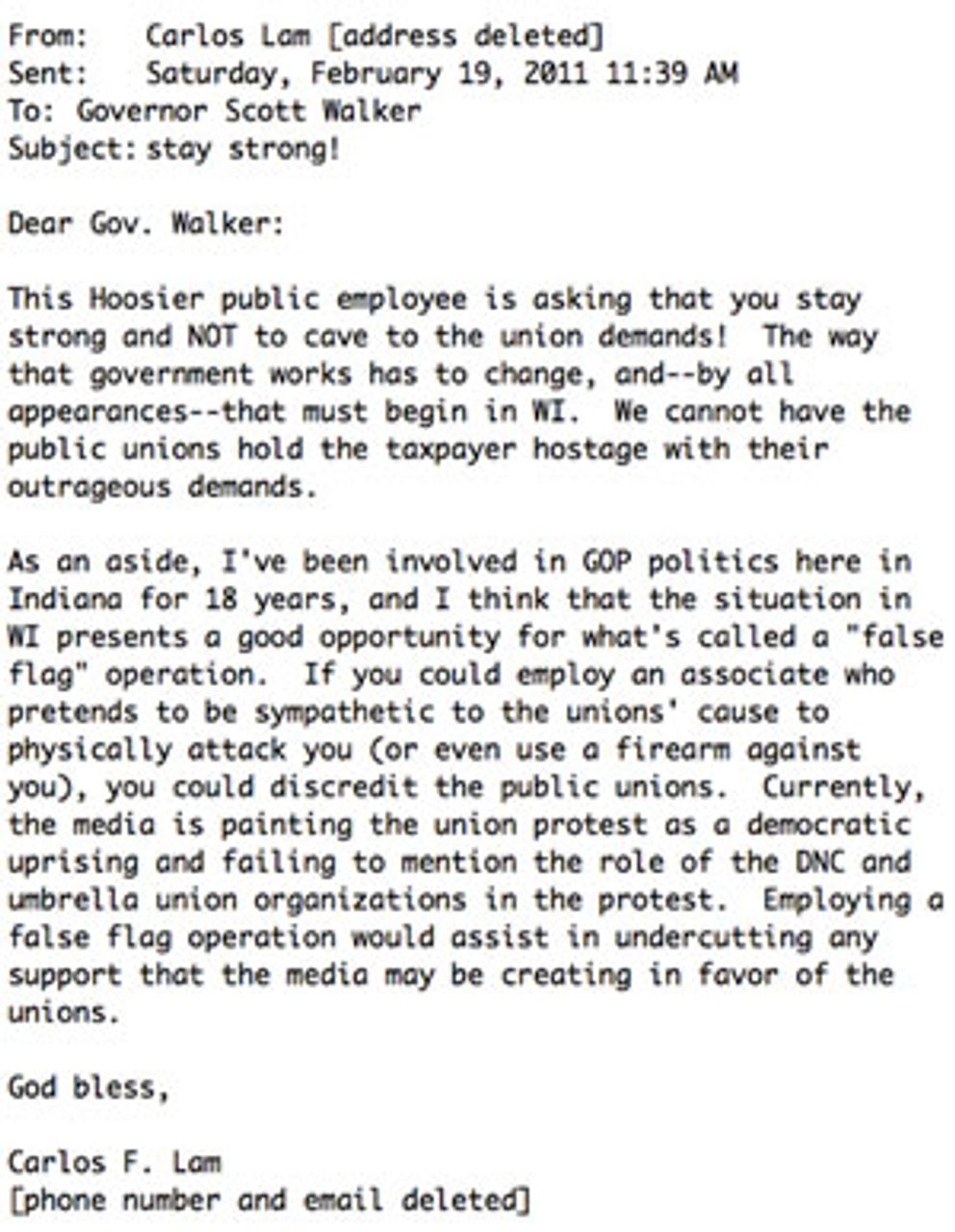An Indiana deputy prosecutor urged Wisconsin Governor Scott Walker to stage a violent provocation in order to discredit opposition to his attack on public employees and facilitate a police crackdown on protesters, according to February 19 email uncovered by the Wisconsin Center for Investigative Journalism.

Carlos F. Lam, a deputy prosecutor from southern Indiana and a long-time Republican operative, told Walker “the situation in WI presents a good opportunity for what’s called a ‘false flag’ operation. If you could get an associate who pretends to be sympathetic to the unions’ cause to physically attack you (or even use a firearm against you), you could discredit the public unions.”
The fake assassination attempt, Lam argued, would be attributed to protesters and undercut the view that the demonstrations against Walker were “a democratic uprising.”
Lam’s email was sent the same day another Indiana prosecutor, state Deputy Attorney General Jeffrey Cox, used his private Twitter account to suggest Wisconsin police “use live ammunition” to clear out the thousands of protesters occupying the State Capitol building in Madison. Cox was forced to resign after Mother Jones magazine made his comments public last month.
Lam’s first response to the exposure was to deny he sent the message to Walker, even though it bore his email and Internet Protocol (IP) address. “I am flabbergasted and would never advocate for something like this,” he told a reporter from the Madison-based Center for Investigative Journalism. Lam then suggested political enemies had hacked into his account.
In the early morning hours of last Thursday, however, as the story by the investigative journalism group was about to be published, Lam submitted his resignation, admitting he had sent the email.
The Wisconsin Center for Investigative Journalism discovered Lam’s email among tens of thousands released to media organizations earlier this month as part of an open-records lawsuit settlement with the Madison publication Isthmus and the Associated Press. It was in a folder produced by the governor’s office called “Pro,” full of emails supporting the governor’s budget repair bill, according to reporter Kate Golden.
The proposals by Indiana law enforcement officials to use violence and provocations followed the eruption of mass protests by workers and young people in opposition to Walker’s proposal to strip nearly all of the state’s 375,000 public employees of collective bargaining rights and virtually illegalize any form of collective resistance. The governor was the first to suggest that state violence might be necessary to deal with popular resistance, telling reporters that as “commander-in-chief” he was prepared to call out the National Guard and was ready “for whatever may happen.”
Then in a February 22 telephone conversation with a blogger posing as billionaire David Koch—one of Walker’s biggest financial backers—the Republican governor acknowledged that he had considered using provocateurs against demonstrators. When the blogger suggested planting “troublemakers in the crowd” Walker said, “We thought about that” but added the idea had problems. “My only fear would be is if there was a ruckus caused is that that would scare the public into thinking maybe the governor has gotta settle to avoid all these problems,” Walker told the blogger.
Like his Republican counterpart in Wisconsin, Indiana Governor Mitch Daniels is seeking to strip public employees of collective bargaining rights and impose huge social spending cuts. It is clear authorities in both states are contemplating the use of violence and provocations to ram through deeply unpopular measures on behalf of powerful corporate and financial interests they represent.
That such conspiracies—usually employed in wartime and in counterinsurgency operations—are being openly discussed is a measure of the decay of democracy in the US and the explosive class tensions that characterize the country. It also further exposes the rise to prominence of fascistic elements within the ranks of the Republican Party, a fact that is routinely ignored or downplayed by the media and the Democrats.
The interest of the financial oligarchy that rules America is incompatible with the maintenance of traditional democratic forms. Deep social spending cuts and the destruction of workers’ living standards—side by side with more tax cuts and subsidies for the rich—can only be imposed through authoritarian and dictatorial methods.
During the month-long battle that gripped Wisconsin from mid-February to mid-March the working class demonstrated its determination and capacity to fight. But this struggle was betrayed by the trade unions, which worked with the Democratic Party to impose Walker’s economic demands in exchange for preserving the narrow interests of the labor apparatus, above all its dues income.
When Walker rammed through his bill on March 9 the unions blocked growing demands for a general strike and called off any further action, handing the Republican governor a victory.
The unions have used a delay in publishing the law, due to legal challenges, to sign scores of contract extensions that impose Walker’s economic demands—including a $4,000 cut in take-home pay for the average public employee—in exchange for maintaining the dues check-off system, which is prohibited by the law but only after current contracts expire.
Last week, the Legislative Reference Bureau published the law at the request of the Republican Senate leader, and the Walker administration announced it would be implemented immediately. According to a report by the Associated Press, Walker’s top aide Mike Huebsch said the administration was preparing a computer program to take out the new deductions for health and pension contributions and stop the deduction of union dues on paychecks state workers will receive April 21.
The defense of the democratic and social rights of the working class is only possible if workers embark on a new road of struggle, which involves building new organizations of industrial and political struggle, above all a mass socialist political movement to oppose both corporate-backed parties and the bankrupt capitalist system they defend.
